Film Review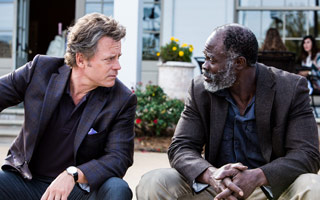 My experience with the story of Same Kind of Different as Me began in 2014 when I was invited to visit the filming of the movie on location in Mississippi. I had not heard of the book the film was based on, so I got a hold of the audiobook to quickly familiarize myself with the story before making the trip. The film was finished in the fall of 2014, but release was delayed for three years, waiting for just the right time to be released. Finally, Ron Hall’s story of love, forgiveness, loss and unexpected friendship finally releases for the world to see on the big screen. My experience with the story of Same Kind of Different as Me began in 2014 when I was invited to visit the filming of the movie on location in Mississippi. I had not heard of the book the film was based on, so I got a hold of the audiobook to quickly familiarize myself with the story before making the trip. The film was finished in the fall of 2014, but release was delayed for three years, waiting for just the right time to be released. Finally, Ron Hall’s story of love, forgiveness, loss and unexpected friendship finally releases for the world to see on the big screen.
Same Kind of Different as Me follows the true story of an art dealer named Ron Hall and his experiences with serving the homeless. But the story is filled with gritty examples of the harsh realities of life. This particular story begins with his wife, Debbie, learning of his infidelity. They had grown apart, which led to his own wandering, but it put the couple in a position to decide whether or not they wanted to fight for their marriage or go their separate ways. Shortly after they fight over the revelation of Ron’s adulterous ways, Debbie has a vivid dream about a mysterious black man that leaves her puzzled. Soon after this, she drags Ron reluctantly to a soup kitchen to make him help serve the homeless (as part of his reparations for his mistake), when suddenly the man from her dream bursts through the door wielding a baseball bat and violently makes a scene. It’s then that she realizes this homeless man, nicknamed “Suicide,” was in fact the man in her dream. What unfolds is a unique culture clash as Ron and Debbie go out of their way to get to know this man — whose real name is Denver — and it changes their lives forever.
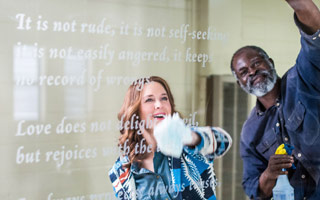 Same Kind of Different as Me isn’t your typical Christian or faith-based film. It’s nowhere near as dark (or cynical) as something like Blue Like Jazz, but it’s hardly fluffy like some Christian films can seem. There’s an authenticity to the way faith is portrayed in the film; it’s never preachy and it is more just part of the story than the main catalyst for the story. (If you’ve seen any number of Christian films, you’ve probably seen one–or more–where the gospel is worked forcefully into scenes, often accompanied by poor acting.) Ron and Debbie were believers at the time that this story takes place, but Debbie’s fervor was a bit more intense than Ron’s, and she was quicker to venture outside of her comfort zone to do whatever she felt God was calling her to do. And when the Halls stepped out of their comfortable lifestyle to get their hands dirty helping the less fortunate, their world expanded in ways they couldn’t imagine. Denver is a complex person, played incredibly and with great intensity by Djimon Hounsou (Guardians of the Galaxy, Gladiator), and his presence gives the film a distinctly unique feel. When we’re first introduced to Ron, and then Debbie, it feels like it’s a completely different film. It changes drastically once Denver is brought in, and we even learn significant pieces of his backstory through flashback that help flesh out his completely different way of life and upbringing. Race becomes an important theme, but it’s not the central one. The story is rich with many layers, and it all works pretty well, thanks to the acting chops of Greg Kinnear, Renee Zellwegger and Hounsou. Through seeing the relationship Hall had with his alcoholic father, played by Jon Voight, you realize that this wealthy white art dealer’s life hasn’t been a walk in the park either. The core story of the film is really about the lives of Ron and Denver, with how the life of Debbie Hall greatly impacted them both — and how God used her to change their lives and the lives of others around them. Through Hall’s telling of this story, and Michael Carney’s direction, there’s really a lot to unpack here, and it’s tough not to get emotionally invested in this story and the lives of these people. The fact that these were (and are) real people make it all the more impactful too. Same Kind of Different as Me isn’t your typical Christian or faith-based film. It’s nowhere near as dark (or cynical) as something like Blue Like Jazz, but it’s hardly fluffy like some Christian films can seem. There’s an authenticity to the way faith is portrayed in the film; it’s never preachy and it is more just part of the story than the main catalyst for the story. (If you’ve seen any number of Christian films, you’ve probably seen one–or more–where the gospel is worked forcefully into scenes, often accompanied by poor acting.) Ron and Debbie were believers at the time that this story takes place, but Debbie’s fervor was a bit more intense than Ron’s, and she was quicker to venture outside of her comfort zone to do whatever she felt God was calling her to do. And when the Halls stepped out of their comfortable lifestyle to get their hands dirty helping the less fortunate, their world expanded in ways they couldn’t imagine. Denver is a complex person, played incredibly and with great intensity by Djimon Hounsou (Guardians of the Galaxy, Gladiator), and his presence gives the film a distinctly unique feel. When we’re first introduced to Ron, and then Debbie, it feels like it’s a completely different film. It changes drastically once Denver is brought in, and we even learn significant pieces of his backstory through flashback that help flesh out his completely different way of life and upbringing. Race becomes an important theme, but it’s not the central one. The story is rich with many layers, and it all works pretty well, thanks to the acting chops of Greg Kinnear, Renee Zellwegger and Hounsou. Through seeing the relationship Hall had with his alcoholic father, played by Jon Voight, you realize that this wealthy white art dealer’s life hasn’t been a walk in the park either. The core story of the film is really about the lives of Ron and Denver, with how the life of Debbie Hall greatly impacted them both — and how God used her to change their lives and the lives of others around them. Through Hall’s telling of this story, and Michael Carney’s direction, there’s really a lot to unpack here, and it’s tough not to get emotionally invested in this story and the lives of these people. The fact that these were (and are) real people make it all the more impactful too.
It’s a tricky thing translating a book into a feature film. It was a wise choice to make the film more so about Hall recalling the story in order to write the book, and I enjoyed seeing those intermittent sequences. The pacing could be a problem for some though, with some slower sequences or drawn-out ones, where it almost edges a little on awkwardness. However, it lends a sense of intimacy to the story, too, allowing us to settle in and get to know these people, who are so wonderfully portrayed by Kinnear, Zellwegger and Hounsou. However, some of the peripheral characters feel a bit like caricatures, especially the two Hall children — who feel like set dressing more than real people. Their son, who appears in a few scenes, doesn’t even have a line in the film. And in one key scene, it feels really odd that he just sits there quietly and doesn’t say a word as his mother talks to him. But, thankfully, the outstanding core performances make up for any weak spots along the way.
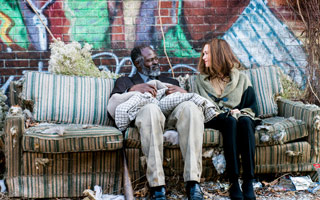 The movie certainly isn’t for everyone. It’s first and foremost a drama, and the last act is pretty weighty given its themes. Also, from Denver’s baseball-bat swinging introduction to some KKK related flashbacks, there are some serious and brief violent scenes that could surprise a few (especially younger viewers). There’s also a significant character death in the story that brings about some serious discussions in the film and a deeper emotional element. As far as other content goes, Ron’s cheating on Debbie is only mentioned briefly, with the resulting conversation between the two handling the topic rather delicately. There’s also a very brief passionate moment later in the film between Ron and Debbie that implies they sleep together, but, again, it’s handled tastefully (and, afterall, they are married). Profanity is limited to about four uses of “hell,” mostly in an inoffensive way, and roughly five uses of “n*gger” when Denver is relating stories of racial discrimination from his past. Finally, alcoholism is a heavy theme as we see Ron’s father drinking in nearly every one of his scenes and often appearing drunk and slurring his speech. The movie certainly isn’t for everyone. It’s first and foremost a drama, and the last act is pretty weighty given its themes. Also, from Denver’s baseball-bat swinging introduction to some KKK related flashbacks, there are some serious and brief violent scenes that could surprise a few (especially younger viewers). There’s also a significant character death in the story that brings about some serious discussions in the film and a deeper emotional element. As far as other content goes, Ron’s cheating on Debbie is only mentioned briefly, with the resulting conversation between the two handling the topic rather delicately. There’s also a very brief passionate moment later in the film between Ron and Debbie that implies they sleep together, but, again, it’s handled tastefully (and, afterall, they are married). Profanity is limited to about four uses of “hell,” mostly in an inoffensive way, and roughly five uses of “n*gger” when Denver is relating stories of racial discrimination from his past. Finally, alcoholism is a heavy theme as we see Ron’s father drinking in nearly every one of his scenes and often appearing drunk and slurring his speech.
Same Kind of Different as Me isn’t your typical cinematic experience. Aside from being a slower form of storytelling than the average popcorn-munching moviegoer today may be accustomed to, it’s a deep and rich story about humanity, social status, faith, love, forgiveness, and sacrifice. It’s a beautiful story that’ll stick with the viewer long after the credits finish rolling, and something truly inspirational that begs the viewer to get up out of their seat and love someone outside the confines of their own comfort zone.
– John DiBiase (reviewed: 8/10/17)
Parental Guide: Brief Summary of Content Sex/Nudity: A woman ambiguously tells Ron at an art auction that if he doesn’t tell Debbie, she will. In the next scene, we see Ron and Debbie fighting about an affair he’s having. He argues that he and Debbie haven’t been intimate in 2 years. She yells back that they haven’t had sex in 2 years, but haven’t been intimate in ten years; Debbie tells Ron that she thought it was sexy that he was helping work at the homeless shelter. They passionately kiss and she takes his hand to lead him away (to presumably sleep together – they are married). Sex/Nudity: A woman ambiguously tells Ron at an art auction that if he doesn’t tell Debbie, she will. In the next scene, we see Ron and Debbie fighting about an affair he’s having. He argues that he and Debbie haven’t been intimate in 2 years. She yells back that they haven’t had sex in 2 years, but haven’t been intimate in ten years; Debbie tells Ron that she thought it was sexy that he was helping work at the homeless shelter. They passionately kiss and she takes his hand to lead him away (to presumably sleep together – they are married).
 Vulgarity/Language: 5 uses of the “n” word; 4 “h*ll” Vulgarity/Language: 5 uses of the “n” word; 4 “h*ll”
 Alcohol/Drugs: Ron’s father is an alcoholic. We see him drinking in several scenes. When we meet him, he’s riding a lawn tractor around a tree repeatedly with a drink in one hand; We see Ron’s father drinking at the dinner table in a few scenes; Ron rejects his dad’s Christmas gift of a bottle of alcohol. Months later, he shows Ron that it’s on his mantle untouched and he’s sober now. Alcohol/Drugs: Ron’s father is an alcoholic. We see him drinking in several scenes. When we meet him, he’s riding a lawn tractor around a tree repeatedly with a drink in one hand; We see Ron’s father drinking at the dinner table in a few scenes; Ron rejects his dad’s Christmas gift of a bottle of alcohol. Months later, he shows Ron that it’s on his mantle untouched and he’s sober now.
 Blood/Gore: None. Blood/Gore: None.
 Violence: Denver smashes up the soup kitchen with a baseball bat and shatters a large window; Denver smashes Ron’s car window with his bat; In a flashback, we see Denver as a child playing with another kid in a shed full of KKK hoods and other white supremacist paraphernalia. The boys plays “swords” with two large wooden crosses; A young Denver is roped by his neck and dragged behind a car; We see paintings of KKK members in a museum; While working in a field, Denver is handed a shiv by an inmate. He tearfully tells Ron and Debbie of having to use it to kill a man in defense, but we don’t see this. Violence: Denver smashes up the soup kitchen with a baseball bat and shatters a large window; Denver smashes Ron’s car window with his bat; In a flashback, we see Denver as a child playing with another kid in a shed full of KKK hoods and other white supremacist paraphernalia. The boys plays “swords” with two large wooden crosses; A young Denver is roped by his neck and dragged behind a car; We see paintings of KKK members in a museum; While working in a field, Denver is handed a shiv by an inmate. He tearfully tells Ron and Debbie of having to use it to kill a man in defense, but we don’t see this. |
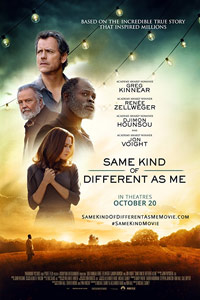
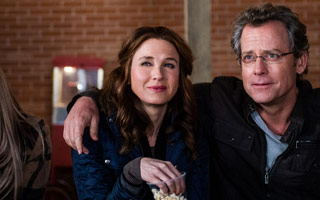 With more money than they could ever possibly need, Ron and Debbie Hall have everything they could ever want … except for a loving marriage. When Ron’s unfaithfulness is brought to light, Debbie invites him to stay—as long as he remains truthful and does what she asks of him. But when her request includes serving the homeless at an inner-city rescue mission, Ron would prefer to write a large check instead.Guided by her faith and spurred on by the dream of a homeless man she senses will change their city, Debbie befriends a disenfranchised man named Denver. More surprisingly, so does Ron. Despite vast differences, their lives begin to intersect and they all are changed forever. (from SameKindofDifferentAsMe.com)
With more money than they could ever possibly need, Ron and Debbie Hall have everything they could ever want … except for a loving marriage. When Ron’s unfaithfulness is brought to light, Debbie invites him to stay—as long as he remains truthful and does what she asks of him. But when her request includes serving the homeless at an inner-city rescue mission, Ron would prefer to write a large check instead.Guided by her faith and spurred on by the dream of a homeless man she senses will change their city, Debbie befriends a disenfranchised man named Denver. More surprisingly, so does Ron. Despite vast differences, their lives begin to intersect and they all are changed forever. (from SameKindofDifferentAsMe.com) My experience with the story of Same Kind of Different as Me began in 2014 when I was invited to visit the filming of the movie on location in Mississippi. I had not heard of the book the film was based on, so I got a hold of the audiobook to quickly familiarize myself with the story before making the trip. The film was finished in the fall of 2014, but release was delayed for three years, waiting for just the right time to be released. Finally, Ron Hall’s story of love, forgiveness, loss and unexpected friendship finally releases for the world to see on the big screen.
My experience with the story of Same Kind of Different as Me began in 2014 when I was invited to visit the filming of the movie on location in Mississippi. I had not heard of the book the film was based on, so I got a hold of the audiobook to quickly familiarize myself with the story before making the trip. The film was finished in the fall of 2014, but release was delayed for three years, waiting for just the right time to be released. Finally, Ron Hall’s story of love, forgiveness, loss and unexpected friendship finally releases for the world to see on the big screen.


 – for thematic elements including some violence and language.
– for thematic elements including some violence and language. Same Kind of Different as Me isn’t your typical Christian or faith-based film. It’s nowhere near as dark (or cynical) as something like Blue Like Jazz, but it’s hardly fluffy like some Christian films can seem. There’s an authenticity to the way faith is portrayed in the film; it’s never preachy and it is more just part of the story than the main catalyst for the story. (If you’ve seen any number of Christian films, you’ve probably seen one–or more–where the gospel is worked forcefully into scenes, often accompanied by poor acting.) Ron and Debbie were believers at the time that this story takes place, but Debbie’s fervor was a bit more intense than Ron’s, and she was quicker to venture outside of her comfort zone to do whatever she felt God was calling her to do. And when the Halls stepped out of their comfortable lifestyle to get their hands dirty helping the less fortunate, their world expanded in ways they couldn’t imagine. Denver is a complex person, played incredibly and with great intensity by Djimon Hounsou (Guardians of the Galaxy, Gladiator), and his presence gives the film a distinctly unique feel. When we’re first introduced to Ron, and then Debbie, it feels like it’s a completely different film. It changes drastically once Denver is brought in, and we even learn significant pieces of his backstory through flashback that help flesh out his completely different way of life and upbringing. Race becomes an important theme, but it’s not the central one. The story is rich with many layers, and it all works pretty well, thanks to the acting chops of Greg Kinnear, Renee Zellwegger and Hounsou. Through seeing the relationship Hall had with his alcoholic father, played by Jon Voight, you realize that this wealthy white art dealer’s life hasn’t been a walk in the park either. The core story of the film is really about the lives of Ron and Denver, with how the life of Debbie Hall greatly impacted them both — and how God used her to change their lives and the lives of others around them. Through Hall’s telling of this story, and Michael Carney’s direction, there’s really a lot to unpack here, and it’s tough not to get emotionally invested in this story and the lives of these people. The fact that these were (and are) real people make it all the more impactful too.
Same Kind of Different as Me isn’t your typical Christian or faith-based film. It’s nowhere near as dark (or cynical) as something like Blue Like Jazz, but it’s hardly fluffy like some Christian films can seem. There’s an authenticity to the way faith is portrayed in the film; it’s never preachy and it is more just part of the story than the main catalyst for the story. (If you’ve seen any number of Christian films, you’ve probably seen one–or more–where the gospel is worked forcefully into scenes, often accompanied by poor acting.) Ron and Debbie were believers at the time that this story takes place, but Debbie’s fervor was a bit more intense than Ron’s, and she was quicker to venture outside of her comfort zone to do whatever she felt God was calling her to do. And when the Halls stepped out of their comfortable lifestyle to get their hands dirty helping the less fortunate, their world expanded in ways they couldn’t imagine. Denver is a complex person, played incredibly and with great intensity by Djimon Hounsou (Guardians of the Galaxy, Gladiator), and his presence gives the film a distinctly unique feel. When we’re first introduced to Ron, and then Debbie, it feels like it’s a completely different film. It changes drastically once Denver is brought in, and we even learn significant pieces of his backstory through flashback that help flesh out his completely different way of life and upbringing. Race becomes an important theme, but it’s not the central one. The story is rich with many layers, and it all works pretty well, thanks to the acting chops of Greg Kinnear, Renee Zellwegger and Hounsou. Through seeing the relationship Hall had with his alcoholic father, played by Jon Voight, you realize that this wealthy white art dealer’s life hasn’t been a walk in the park either. The core story of the film is really about the lives of Ron and Denver, with how the life of Debbie Hall greatly impacted them both — and how God used her to change their lives and the lives of others around them. Through Hall’s telling of this story, and Michael Carney’s direction, there’s really a lot to unpack here, and it’s tough not to get emotionally invested in this story and the lives of these people. The fact that these were (and are) real people make it all the more impactful too. The movie certainly isn’t for everyone. It’s first and foremost a drama, and the last act is pretty weighty given its themes. Also, from Denver’s baseball-bat swinging introduction to some KKK related flashbacks, there are some serious and brief violent scenes that could surprise a few (especially younger viewers). There’s also a significant character death in the story that brings about some serious discussions in the film and a deeper emotional element. As far as other content goes, Ron’s cheating on Debbie is only mentioned briefly, with the resulting conversation between the two handling the topic rather delicately. There’s also a very brief passionate moment later in the film between Ron and Debbie that implies they sleep together, but, again, it’s handled tastefully (and, afterall, they are married). Profanity is limited to about four uses of “hell,” mostly in an inoffensive way, and roughly five uses of “n*gger” when Denver is relating stories of racial discrimination from his past. Finally, alcoholism is a heavy theme as we see Ron’s father drinking in nearly every one of his scenes and often appearing drunk and slurring his speech.
The movie certainly isn’t for everyone. It’s first and foremost a drama, and the last act is pretty weighty given its themes. Also, from Denver’s baseball-bat swinging introduction to some KKK related flashbacks, there are some serious and brief violent scenes that could surprise a few (especially younger viewers). There’s also a significant character death in the story that brings about some serious discussions in the film and a deeper emotional element. As far as other content goes, Ron’s cheating on Debbie is only mentioned briefly, with the resulting conversation between the two handling the topic rather delicately. There’s also a very brief passionate moment later in the film between Ron and Debbie that implies they sleep together, but, again, it’s handled tastefully (and, afterall, they are married). Profanity is limited to about four uses of “hell,” mostly in an inoffensive way, and roughly five uses of “n*gger” when Denver is relating stories of racial discrimination from his past. Finally, alcoholism is a heavy theme as we see Ron’s father drinking in nearly every one of his scenes and often appearing drunk and slurring his speech.